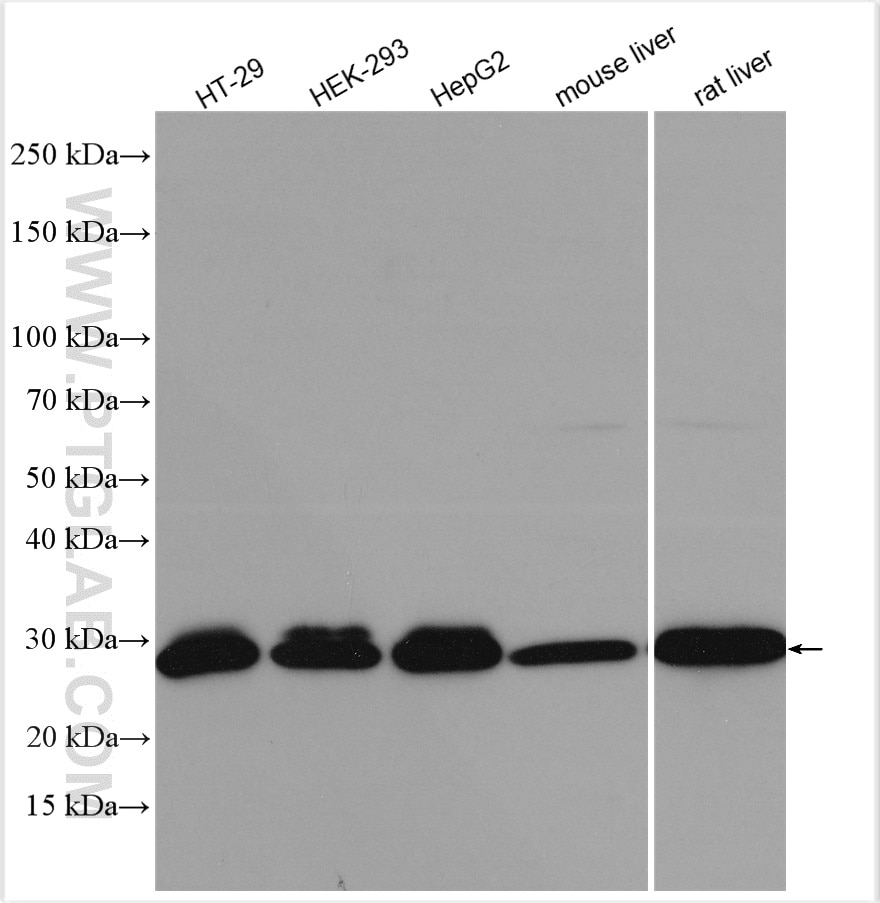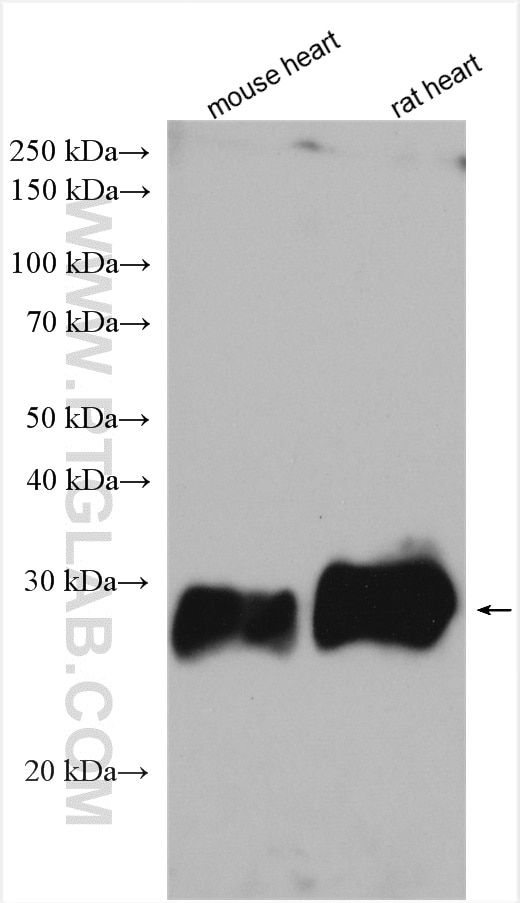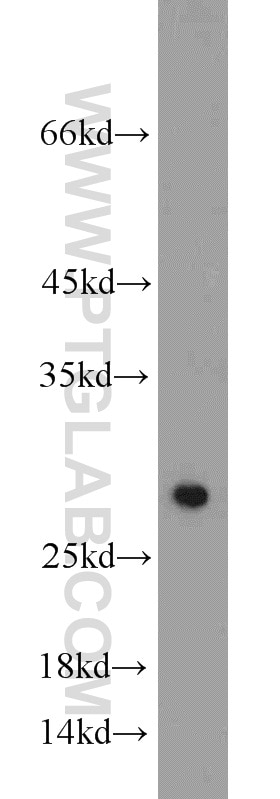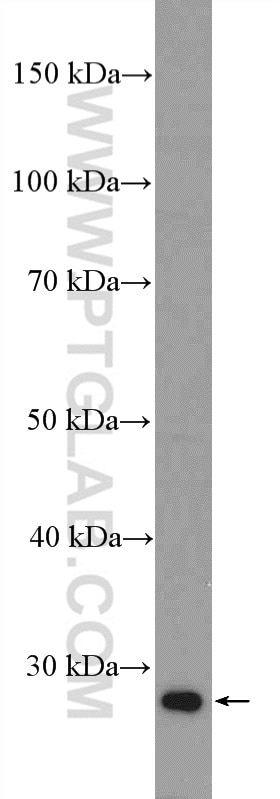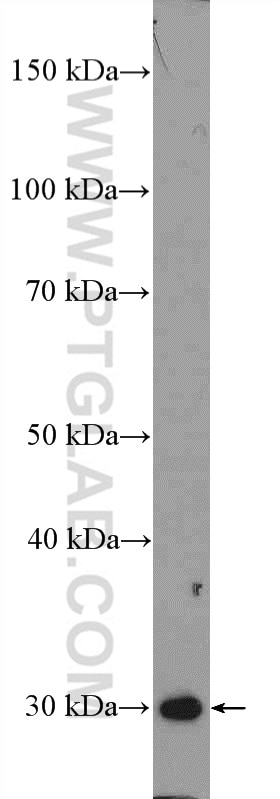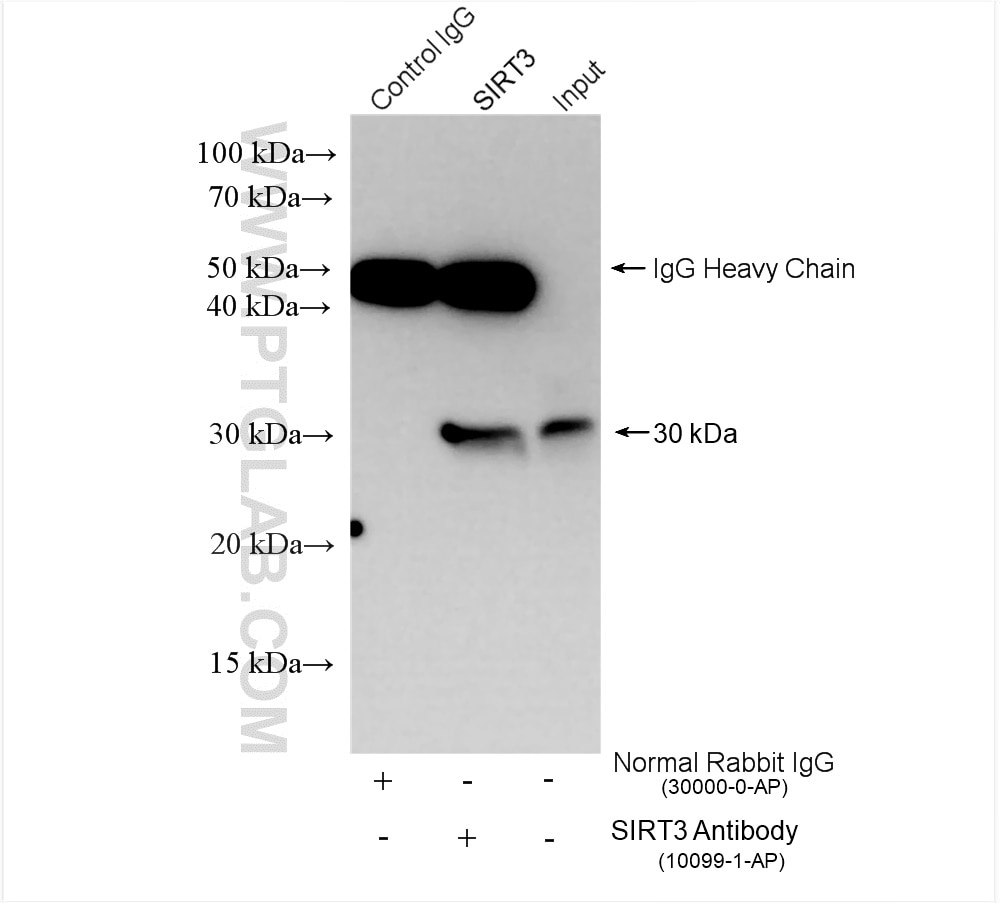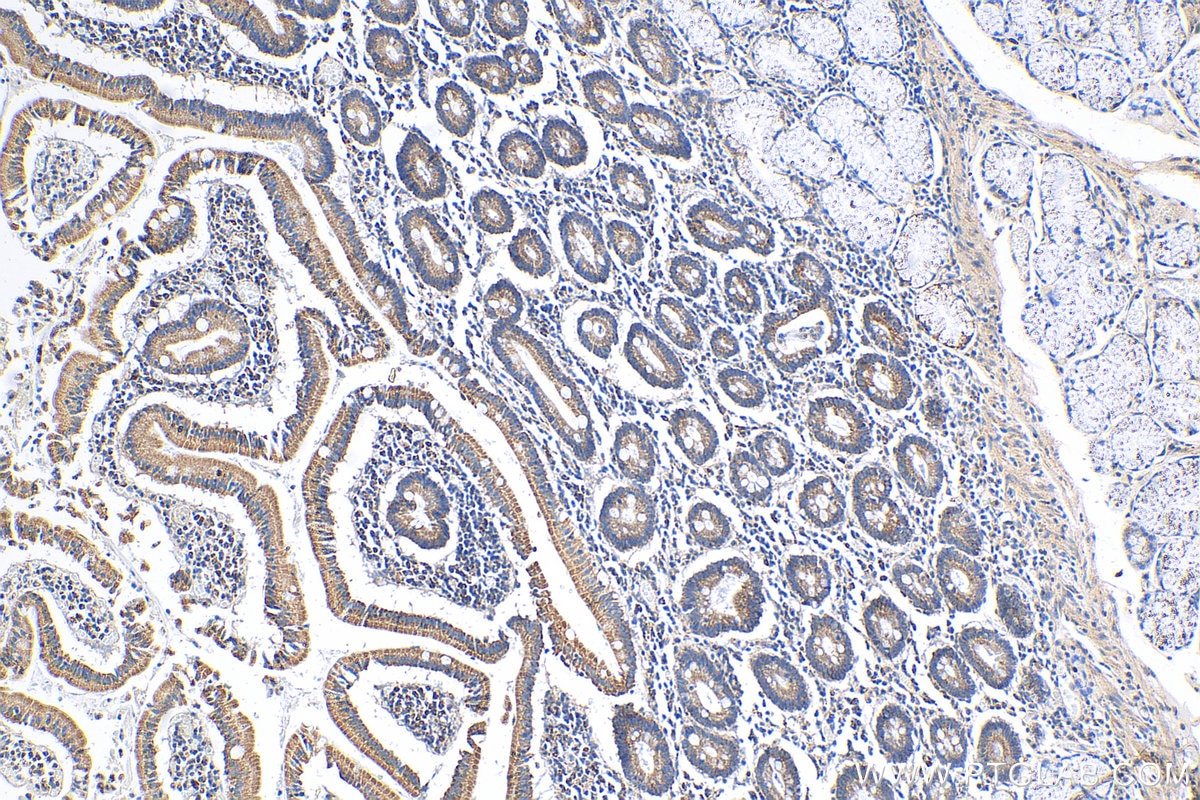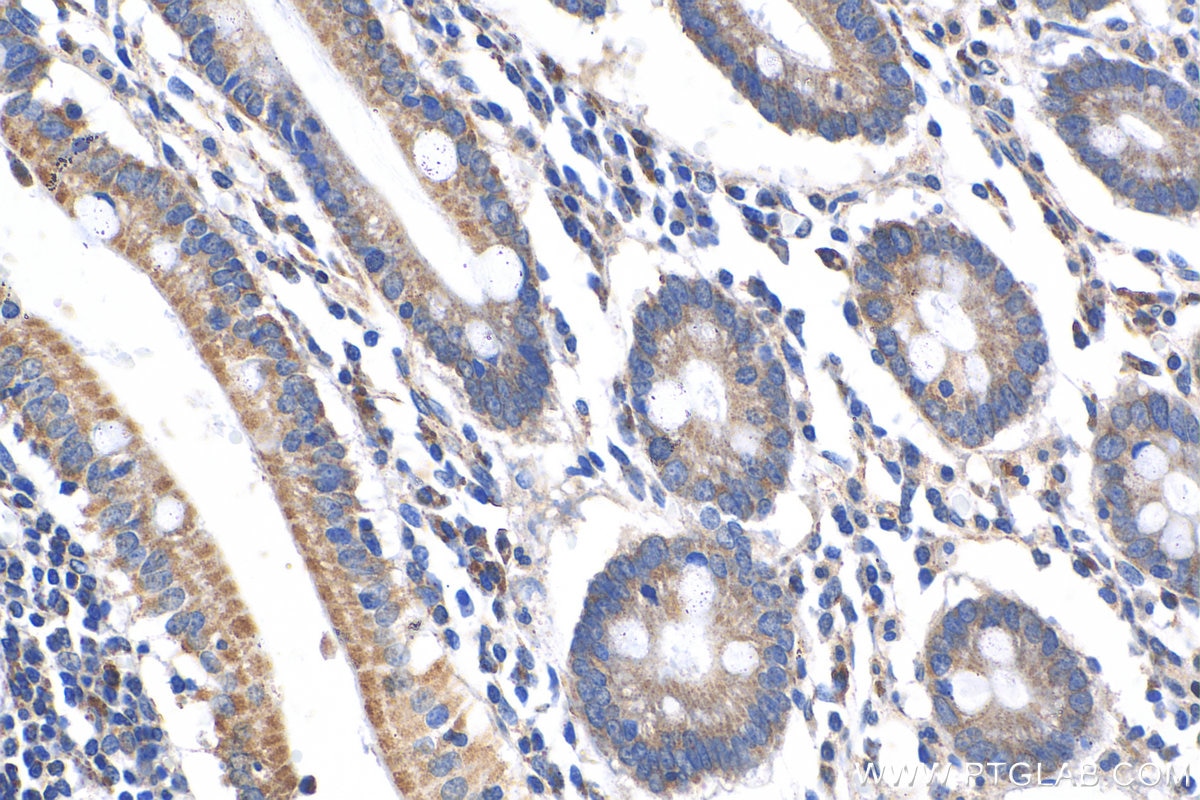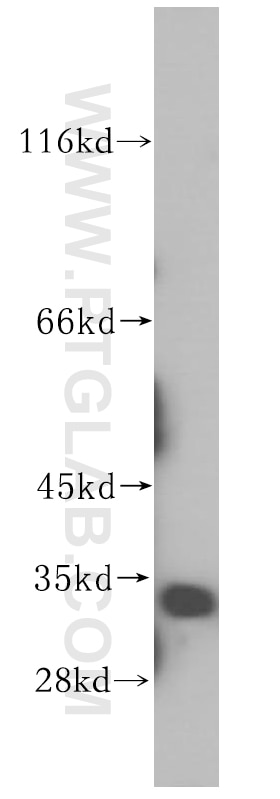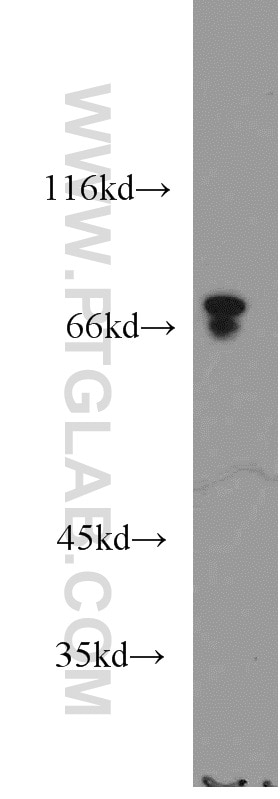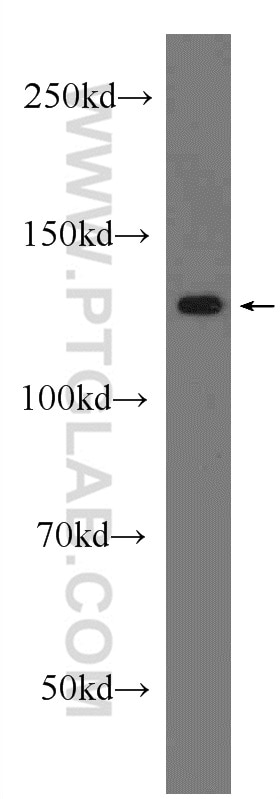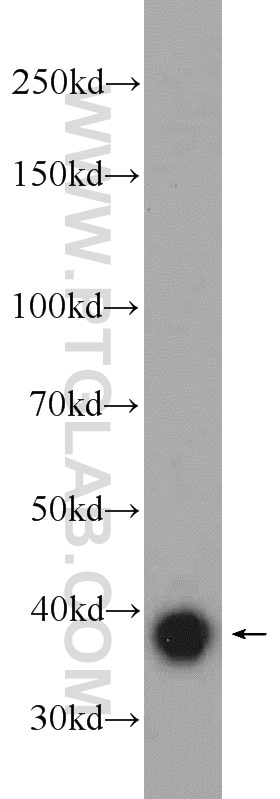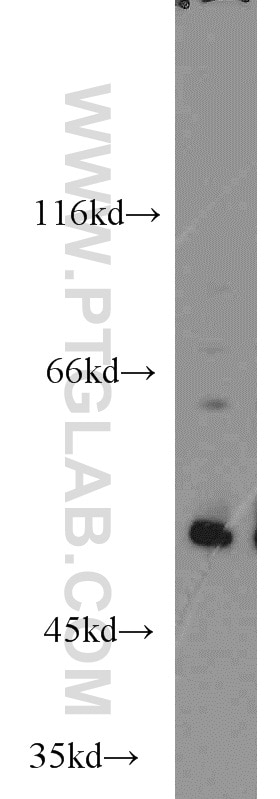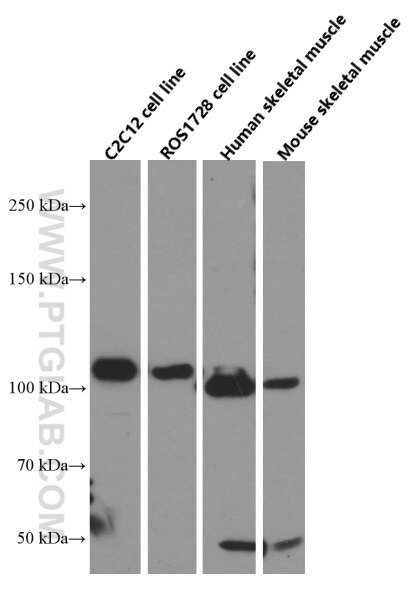- Phare
- Validé par KD/KO
Anticorps Polyclonal de lapin anti-SIRT3
SIRT3 Polyclonal Antibody for WB, IP, ELISA
Hôte / Isotype
Lapin / IgG
Réactivité testée
Humain, rat, souris et plus (3)
Applications
WB, IP, CoIP, ELISA
Conjugaison
Non conjugué
110
N° de cat : 10099-1-AP
Synonymes
Galerie de données de validation
Applications testées
| Résultats positifs en WB | cellules HT-29, cellules HEK-293, cellules HepG2, tissu cardiaque de rat, tissu cardiaque de souris, tissu de muscle squelettique de souris, tissu hépatique de rat, tissu hépatique de souris, tissu rénal de souris, tissu splénique humain |
| Résultats positifs en IP | cellules HT-29, |
| Résultats positifs en IHC | tissu d'estomac humain, il est suggéré de démasquer l'antigène avec un tampon de TE buffer pH 9.0; (*) À défaut, 'le démasquage de l'antigène peut être 'effectué avec un tampon citrate pH 6,0. |
Dilution recommandée
| Application | Dilution |
|---|---|
| Western Blot (WB) | WB : 1:1000-1:8000 |
| Immunoprécipitation (IP) | IP : 0.5-4.0 ug for 1.0-3.0 mg of total protein lysate |
| Immunohistochimie (IHC) | IHC : 1:200-1:800 |
| It is recommended that this reagent should be titrated in each testing system to obtain optimal results. | |
| Sample-dependent, check data in validation data gallery | |
Applications publiées
| KD/KO | See 19 publications below |
| WB | See 107 publications below |
| IP | See 2 publications below |
| CoIP | See 4 publications below |
Informations sur le produit
10099-1-AP cible SIRT3 dans les applications de WB, IP, CoIP, ELISA et montre une réactivité avec des échantillons Humain, rat, souris
| Réactivité | Humain, rat, souris |
| Réactivité citée | rat, bovin, Chèvre, Humain, porc, souris |
| Hôte / Isotype | Lapin / IgG |
| Clonalité | Polyclonal |
| Type | Anticorps |
| Immunogène | SIRT3 Protéine recombinante Ag0148 |
| Nom complet | sirtuin (silent mating type information regulation 2 homolog) 3 (S. cerevisiae) |
| Masse moléculaire calculée | 44 kDa |
| Poids moléculaire observé | 28 kDa |
| Numéro d’acquisition GenBank | BC001042 |
| Symbole du gène | SIRT3 |
| Identification du gène (NCBI) | 23410 |
| Conjugaison | Non conjugué |
| Forme | Liquide |
| Méthode de purification | Purification par affinité contre l'antigène |
| Tampon de stockage | PBS avec azoture de sodium à 0,02 % et glycérol à 50 % pH 7,3 |
| Conditions de stockage | Stocker à -20°C. Stable pendant un an après l'expédition. L'aliquotage n'est pas nécessaire pour le stockage à -20oC Les 20ul contiennent 0,1% de BSA. |
Informations générales
Sirtuins are NAD+-dependent histone/protein deacetylases (HDAC) and SIRT3 is the only sirtuin whose increased expression has been shown to correlate with an extended life span in humans. It is localized in the mitochondrial matrix, where it regulates the acetylation levels of metabolic enzymes, including acetyl coenzyme A synthetase 2. SIRT3 is stress-responsive and its increased expression protects myocytes from genotoxic and oxidative stress-mediated cell death. full-length hSIRT3 (44 kDa) is an inert protein and that it is activated inside the mitochondria following deletion of 142 amino acids of the N-terminal segment. This processed form of SIRT3 is approximately 28 kDa and possesses deacetylase activity. The full SIRT3 is a 44 kDa protein and is processed by mitochondrial processing peptidase (MPP) to give a 28 kDa product.
Protocole
| Product Specific Protocols | |
|---|---|
| WB protocol for SIRT3 antibody 10099-1-AP | Download protocol |
| IHC protocol for SIRT3 antibody 10099-1-AP | Download protocol |
| IP protocol for SIRT3 antibody 10099-1-AP | Download protocol |
| Standard Protocols | |
|---|---|
| Click here to view our Standard Protocols |
Publications
- Journal Impact Factor
- Most recent
| Species | Application | Title |
|---|---|---|
Cell Metab Elevation of JAML Promotes Diabetic Kidney Disease by Modulating Podocyte Lipid Metabolism. | ||
Nat Commun Sirt6 deficiency exacerbates podocyte injury and proteinuria through targeting Notch signaling. | ||
Nat Commun Cordycepin prevents radiation ulcer by inhibiting cell senescence via NRF2 and AMPK in rodents. | ||
Redox Biol Adiponectin/AdiopR1 signaling prevents mitochondrial dysfunction and oxidative injury after traumatic brain injury in a SIRT3 dependent manner. | ||
J Pharm Anal Cornus officinalis with high pressure wine steaming enhanced anti-hepatic fibrosis: Possible through SIRT3-AMPK axis | ||
Biomed Pharmacother Cyclovirobuxine D alleviates aldosterone-induced myocardial hypertrophy by protecting mitochondrial function depending on the mutual regulation of Nrf2-SIRT3 |
Avis
The reviews below have been submitted by verified Proteintech customers who received an incentive forproviding their feedback.
FH Tanusree (Verified Customer) (12-18-2019) | Product worked well in WB at 1:500 dilution
|
